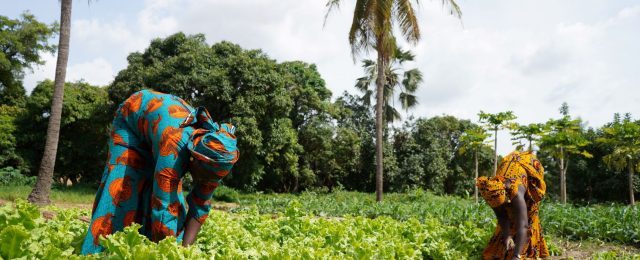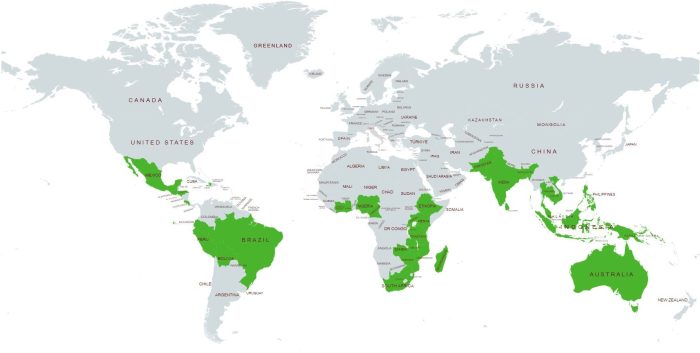Transforming food systems with small-scale food producers at its heart

The role of small-scale producers in the global food system is crucial and multifaceted. This blog emphasizes the need for greater transparency and company engagement with small-scale producers in low and middle-income countries.
Smallholder farmers produce a third of the world’s food and small-scale fisheries contribute about 32% of the global seafood nutrient supply. Both groups are among the most vulnerable in the agricultural supply chain suffering from hunger and an unstable income. These primary producers play a crucial role in transforming global food systems, holding the key to increasing food diversity and providing nutritious diets to more than two billion facing moderate to severe food insecurity. While our food systems contribute to economic growth and increased food production, there’s a pressing question: How will we feed a growing population within planetary boundaries? Furthermore, how well are our food systems including and engaging with small-scale producers to catalyse this change? The World Benchmarking Alliance (WBA) is actively discussing this, and in this blog, we want to highlight the need for increased transparency and action to address issues across the food value chain that impact millions of small-scale producers, especially in low- and middle-income countries.
In the Food and Agriculture Benchmark, we look at the 350 most influential companies in the food and agriculture sector, which have significant power in shaping our global food system. These companies are active in the agricultural inputs, agricultural products and commodities, animal proteins, manufacturing and processing, retail and food service segments. The Benchmark’s main goal is to encourage these influential companies to adopt sustainable practices throughout their operations and use their influence to motivate their value chain partners to do the same. However, according to WBA’s 2022 report ‘The role of benchmarking in food and agriculture supply chains‘, only 19% of the 350 companies disclose information about some of their suppliers, including these small-scale producers. What is interesting is that the companies that do disclose their supply chain information often focus on their closest suppliers (tier 1 and 2), mainly located in high-income countries like the EU and the USA.
Building resilient supply chains with small-scale producers
It’s worrying when companies are not transparent about their relationships with suppliers, as it suggests they lack oversight of their supply chains and don’t fully understand the impact of their activities. For instance, they may not be tackling challenges with small-scale producers in mind, like access to agricultural inputs, the use of technology, or improving productivity. Market access for small-scale producers is another problem when selling products to multinationals, involving issues like unfair pricing, and lack of skills or resources to meet certification standards.
Activities such as product traceability, supply chain due diligence and stakeholder dialogues involving small-scale producers could help large multinationals focus on areas that need action and make evidence-based decisions to transform our food systems for the people and the planet. Understanding the impact of multinational companies on small-scale producers and making their actions consequential to their success is also critical to closing the corporate accountability gap and aligns with the changing regulatory environment like the newly adopted EU regulations on supply chain transparency and impacts. The link between small-scale farmers and fishers and food businesses affects important issues like climate change, food security, biodiversity conservation, human rights, and water resources. To address the adverse impacts of the food system and to build resilience across global supply chains, establishing long-term, resilient relationships with small-scale producers is key.
Small-scale producers are key to food security but are generally overlooked by large multinationals
To sharpen the understanding of the efforts of 350 companies in engaging with small-scale producers, WBA collected additional data to complement the data gathered as part of the 2023 benchmarking cycle. The results show that 350 companies source at least 30 different food commodities, such as coffee, cocoa and palm oil, from around 75 million small-scale producers based in 40 low-and middle-income countries. 27% of these 350 companies have activities and/or commitments involving small-scale producers in their supply chain. Company engagement with small-scale producers is often limited which could be due to the perceived risks related to this market segment.
Among the companies that have activities supporting small-scale producers, the majority focus on increasing awareness and training on topics such as good agricultural practices to increase farmer productivity while issues prevalent in the sector such as persistent hunger, respecting human rights and providing good working and living conditions, access to output markets and financial solutions, among others, remain neglected. The 2023 results of the Food and Agriculture Benchmark show that only 4% of companies identify living income benchmarks or calculate living income gaps to support farming households to earn a sufficient income for a decent standard of living while considering the diverse realities of farmers across the globe.
Recent legislation such as the European Commission’s Corporate Sustainability Due Diligence Directive (CSDDD) is driving the need for due diligence in supply chains but runs the risk of fuelling the disengagement of companies with small-scale producers if unsustainable practices are identified. Instead of terminating business relations, these issues should be recognised and addressed. With several stakeholders such as civil societies, non-profit organisations, academia and financial institutions ready to partner with the private sector in advancing the professionality of small-scale producers, accelerating efforts and increasing investments are needed to improve sustainable agricultural practices to double the productivity and incomes of small-scale producers by 2030 in accordance with target 2.3 of the UN Sustainable development goals.

It is time to be a part of this transformative journey and hear the voice of the impacted
WBA is conducting ongoing stakeholder consultations to better understand the relations between multinational companies and small-scale producers. The focus is on identifying the critical areas of impact that require more dialogue and research. So far, stakeholders agree that unlocking this impact can be a critical driver to improve access to inputs, finance, market, increased productivity, diverse diets and nutrition, inclusive innovation and technology, climate resilience, biodiversity conservation and better livelihoods. WBA’s Food and Agriculture Benchmark can contribute to the transformation of food systems for the benefit of small-scale producers by addressing information gaps, highlighting leading practices and fostering accountability.
From 2024 onwards, we will share insights gathered on the connections between the 350 largest food and agriculture companies and small-scale producers, and seek strategic and funding support for further research and engagement activities. We invite interested stakeholders to be a part of this journey. If you would like to participate in the consultations or collaborate on a joint paper on topics relevant to private-sector monitoring and accountability for small-scale producers, please contact Alice Ingabire and Aarti Misal.